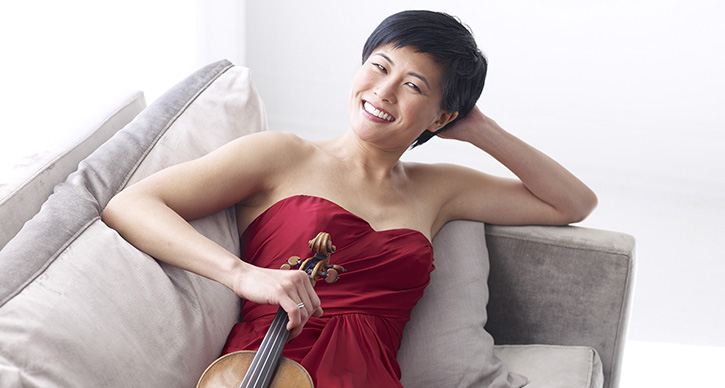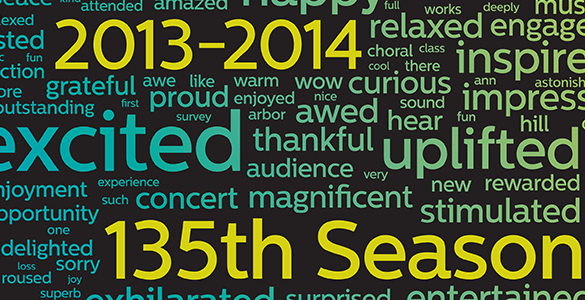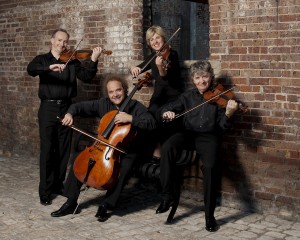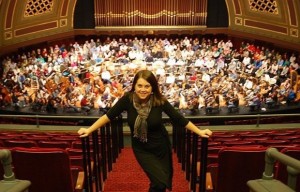#UMSplaylists: Chamber Arts (yMusic Takeover)

Listen Now on
![]()
![]()
In advance of their November 1 performance, yMusic has “taken over” UMS’s Chamber Arts playlist with works of their own discography, including collaborations with Paul Simon, Ben Folds, and Regina Spektor.
Hear the virtuosity and variety of sounds, ensembles, and works by composers featured in UMS’s Chamber Arts Series. This playlist updates with new tracks regularly, so be sure to follow/subscribe on your preferred streaming service!
Preview
Introducing UMS Playlists on Apple Music and Spotify
Open your ears to new listening experiences:
Now Playing
Journeys
Presenting our global artists featured in the 2019/20 ‘Traditions & Crosscurrents’ series.
Solo Piano
Fall in love with solo works performed by classical and jazz pianists who appear in UMS’s 2019/20 season.
Discover More
Chamber Arts
Discover the virtuosity and variety of sounds, ensembles, and works by composers featured in UMS’s Chamber Arts series.
Highlights include:
- A celebration of young composers by yMusic, featuring works by Caroline Shaw, Missy Mazzoli, Andrew Norman, and other luminaries
- Cellist Sheku Kanneh-Mason, who makes his Ann Arbor debut this Fall
- Max Richter’s global chart-topping “recomposition” of Vivaldi’s The Four Seasons
Jazz Redefined
UMS presents modern jazz masters this season, whose collaborations and unique sound push the ever-evolving genre into new sonic territory.
Highlights include:
- Brooklyn based jazz/funk collective Snarky Puppy opens the season with music from their new album, Immigrance
- Tarek Yamani brings his hypnotic fusion of American jazz and Arabic tarab in his UMS debut
- Multiple Grammy Award winning Chick Corea Trilogy joined by an all-star lineup
- UMS favorites Cécile McLorin Salvant and Aaron Diehl join forces in two sets, improvising on the Great American Songbook
Coming Soon
Sign up for UMS’s weekly newsletter to get notified about new playlist updates and releases. In addition to “guest list” takeovers, UMS will have dynamic playlists that update regularly with new tracks, including:
Up Next
A preview of upcoming performances at UMS, updated the beginning of each month during the concert season.
Renegade
Be adventurous. Open your mind and ears to bold new works — in a safe space to listen.
UMS Rewind
Celebrating 140+ years of UMS’s history presenting legendary artists on the University of Michigan’s great stages.
Artist Interview: Jennifer Koh, violinist
Insightful and passionate violinist Jennifer Koh talks with UMS Lobby contributor and composer Garrett Schumann about creative programming choices, contemporary works, and the power of music.
The virtuoso violinist returns to Ann Arbor (following her 2012 appearance in the Philip Glass and Robert Wilson opera Einstein on the Beach) with the third and final part of her Bach and Beyond series on Friday, February 6, 2015.
Garrett Schumann: Throughout your career you’ve maintained a consistent interest in programming contemporary and often newly-commissioned works alongside standard pieces in the violin repertory. Where did this passion for combining tried-and-true pieces with new pieces come from in your development as a violinist?
Jennifer Koh: I think it was always just curiosity. When you first make your foray into discovering classical music, it’s really new to you. Now, to me, it doesn’t really matter what time period the music comes from, whether it is “new” or “old.” The one thing that has been such a great pleasure about working with contemporary music is that I can actually get to meet and work with living composers, and that has been a really wonderful, beautiful part of doing the work.
GS: Do you think that putting older pieces next to contemporary work brings new things out of them?
JK: Everything is in context. We live in a certain age, and every day that passes takes us one day further away from the society of Bach, for example. I actually remember hearing a program by Peter Serkin. This program was a little unusual for him; he was doing all the Bach concerti, and what was fascinating was that everything sounded so modern. I realized that art is about re-discovering.
When I first created the Bach and Beyond program, I bookended the program with Bach because I wanted to create a journey through history and into our contemporary landscape and then return to Bach. You create this circular journey, and you realize that the experience of listening to the things in the middle changes how you hear Bach. And, in a way, it also changes how you frame each of the composers.
I feel that contemporary music links us to the past because it does have this history. Most composers work within the richness of that tradition, but they also add their personal viewpoint to it. The great thing about art, and the great pleasure for me personally as a musician, is that it has the ability to change the world. It creates a situation where people can have a space to be very present, but also go to places that they normally don’t want to go to and access those emotions that they don’t necessarily experience every day.
GS: Speaking of this sort of cyclical nature of Bach and Beyond, what’s really interesting about your performance this season is that when you did your first UMS performance in 2010, you were at the beginning of the Bach and Beyond series. Now that it’s coming to a close, how does that feel?
JK: It’s been an interesting process. I actually remember the very beginning, when it was still very difficult to convince people to do this solo violin program. And I remember when I first came up with the idea, a lot of people said, “Nobody’s going to want to book that.” Nobody does solo violin programs. But now, Bach and Beyond has become much more accepted, so one of the beautiful things for me has been that people have begun to see violin as an instrument that has enough timbre to hold an entire program.
I was also at UMS with Einstein on the Beach, and that experience opened my world in a wonderful way. Those performances were the first preview performances of Einstein, and the first extensive rehearsal process was there. It feels like UMS has been a starting point, and so it’s nice for me to return.
GS: What was the experience of working with director Robert Wilson during Einstein on the Beach like for you?
JK: It was really organic in the sense that it’s always been interesting for me to work with artists that I really admire and respect. When I first met [Robert Wilson], I was intimidated. But then, when I saw how he worked, I felt an immediate connection. I respected his working style because he is a perfectionist, and that’s something that I do myself.
When I got the call for Einstein, I knew immediately that I wanted to be a part of it. But I was actually terrified because I don’t have any acting background. But things that terrify me, I find the most interesting. For example, doing Bach and Beyond when I first thought of it was terrifying as well.
What I hope in the end for any piece, whether it’s Einstein or Bach and Beyond, is that people who actually hear the piece trust you. And that they’ll go along on the journey.
GS: Now that Bach and Beyond is wrapping up, what do you have set up for the future?
JK: My next purely performance-based project is called Bridge to Beethoven. That is really an exploration of all ten Beethoven sonatas, but will also have four new works in conversation with it.
When I first came up with the idea, I had just seen a production of Julius Ceasar by the Royal Shakespeare Company. They had made Julius Ceasar a despotic military junta leader in Africa. Again, that inspired me to think about how changing the setting can really alter our assumptions.
So when I was exploring the Beethoven sonatas, I wanted to approach the assumptions that we have in our current psychology. For a lot of people, Beethoven is the “definition” of classical music. If you say “Beethoven,” people tend to have a very specific perception of the music. The question for me, became, “How has classical music evolved?” If you look at his music, he was quite a revolutionary, but now oftentimes it’s performed such that it doesn’t sound new, it doesn’t sound modern. For me, what was important was to bring out these parts of the music that are not just “elevator music.” To really hear those revolutionary aspects in his compositional process.
What’s also interesting to me and helped to inspire this project is that I come from a non-musical background, but at one point, I discovered music is something that I love. Many American composers also come from non-musical families, so what is it about music that draws us to that platform? I wanted to create that kind of dialogue in a compositional way.
My ethnic roots are also in a country halfway across the world in Asia. How is it that I came across classical music? How is it that this art form has changed my life to the degree that I can’t imagine my life without music? Questions like this are reflected in the project as well.
Anyhow, we’re actually starting it late next season and we start it in California, then we take it to Virginia, and then it will go to New York.
GS: Well, I have to say that as a young idealistic grad student, I really appreciate the consideration you put into the program and the fact that you want to address issues that are larger than the music or parts of the music, these are things that are sometimes missed in the traditional setting.
JK: I agree. There is this idea of reaching outside of what you already know, and it’s becoming less and less common. I think that the arts are great because they are an open experience that’s about empathy, about having an experience that you don’t have on a normal basis.
Interested in learning more? Check out other interviews by Garrett Schumann.
Announcing the 2013-2014 UMS Season!
Surprising. Invigorating. Disruptive. Inspiring. Captivating.
These are just a few of the words we heard when asking audiences for their impressions immediately following performances this past season. This instant reaction gets to the heart of what it means to be present: to be there, in person, interacting with some of the best performers in the world in the extraordinary transaction between artist and audience.
And our 2013-2014 season’s performances will go even one step beyond. Some traditional. Some outside the lines. All designed to move you. But only if you choose to be present.
Watch our season announcement video:
Check out our 2013-2014 season brochure:
We’ve also got the complete 2013-2014 season listing with details about each event on our website.
What performances are you excited about? Tell us in the comments below.
Need the 2013-2014 season announcement video by chapter?
Choral Union
Chamber Arts
Jazz
Global Music
Theater
Dance
And more
11/12 Chamber Arts Series
The 49th Annual Chamber Arts Series presents seven of today’s leading chamber groups performing both traditional and contemporary repertoire.
All performances take place at Rackham Auditorium.
Subscription packages go on sale to the general public on Monday, May 9, and will be available through Friday, September 17. Current subscribers will receive renewal packets in early May and may renew their series upon receipt of the packet. Tickets to individual events will go on sale to the general public on Monday, August 22 (via www.ums.org) and Wednesday, August 24 (in person and by phone). Not sure if you’re on our mailing list? Click here to update your mailing address to be sure you’ll receive a brochure.
Emerson String Quartet
Sunday, September 18, 4pm
Formed in the bicentennial year of the United States, the Emerson String Quartet took its name from the great American poet and philosopher Ralph Waldo Emerson. This return appearance features the quartet in an all-Mozart program, including his three quartets commissioned by the King of Prussia, Friedrich Wilhelm II.
Program
The Late Quartets: “King of Prussia”
Mozart | Quartet No. 21 in D Major, K. 575 (1789)
Mozart | Quartet No. 22 in B-flat Major, K. 589 (1790)
Mozart | Adagio and Fugue in c minor, K. 546 (1788)
Mozart | Quartet No. 23 in F Major, K. 590 (1790)
St. Lawrence String Quartet
Saturday, November 12, 8pm
One of the great finds of the 09/10 season was the St. Lawrence String Quartet, which made its UMS debut during its 20th season in a stellar program of Haydn, Ravel, and John Adams. The SLSQ appears twice with UMS in the 11/12 season; they also perform a new work by John Adams with the San Francisco Symphony as part of the Choral Union Series in March.
Program
Haydn | Quartet No. 57 in C Major, Op. 74, No. 1 (1793)
R.M. Schafer | Quartet No. 3 (1981)
Golijov | New Work (composed for SLSQ) (2011)
Haydn | Quartet No. 61 in d minor, Op. 76, No. 2 (“Quinten”) (1796-97)
Les Violons du Roy
Bernard Labadie, conductor
Maurice Steger, recorder
Saturday, January 28, 8pm
The chamber orchestra Les Violons du Roy borrows its name from the renowned string orchestra of the court of the French kings. Based in Québec City, the group has a core membership of 15 players who were brought together in 1984 for music director Bernard Labadie. They specialize in the vast repertoire of music for chamber orchestra, performed in the stylistic manner most appropriate to each era.
Program
W.F. Bach | Overture in g minor (originally attributed to J.S. Bach, BWV 1070)
Telemann | Concerto for Recorder in C Major, TWV 51:C1
Scarlatti | Concerto Grosso in Seven Parts, No. 3 in F Major, No. 3
Vivaldi | Concerto for Recorder in c minor, RV 441
Geminiani | Concerto Grosso No. 12 in d minor, “La Folia” (after Corelli)
Geminiani | Concerto for Recorder in F Major (after Corelli)
Sabine Meyer and the Trio di Clarone
Saturday, February 4, 8pm
In addition to developing a systematic training program for the clarinet and breeding horses, Sabine Meyer is regarded as one of the most outstanding soloists of our time. She was solo clarinetist with the Berlin Philharmonic, a position she left as she became increasingly in demand as a solo artist. Today, in addition to her solo appearances, she performs in two chamber ensembles, including the Trio di Clarone, whose other members are her husband and her brother. Trio di Clarone began in 1983, in part because of their shared interest in the basset horn, a rare instrument in the clarinet family that was used in Mozart’s Requiem and in his five divertimenti written for a trio of basset horns.
Program
Mozart | Three Arias from The Marriage of Figaro
Poulenc | Sonata for Two Clarinets
Stravinsky | Three Pieces for Clarinet Solo
J.S. Bach | French Suite No. 5 for Two Clarinets and Basset horn
Mozart | Divertimento No. 1 for Three Basset horns, K. 439b
C.P.E. Bach | Duo for Two Clarinets in C Major, Wq. 142
Mozart | Four Arias from Cosi fan tutte for Three Basset horns
Chamber Ensemble of the Shanghai Chinese Orchestra
Friday, February 10, 8pm
The 20 members of the Shanghai Traditional Chamber Ensemble are drawn from the first large-scale modern orchestra of traditional instruments in China. While Chinese stars such as Lang Lang have brought new attention to Western classical music in China, this ensemble provides a window into the traditional Chinese classical music that dates back centuries.
Hagen Quartet
Thursday, February 23, 8pm
Regarded internationally as one of the foremost string quartets of the day, the Hagen Quartet consists of the two brothers Lukas (violin) and Clemens (cello) and their sister Veronika Hagen (viola), along with violinist Rainer Schmidt, who has been with the group for more than 20 years. For this return performance, the Hagen Quartet presents a program of Beethoven quartets, as part of UMS’s focus on musical renegades.
Program
Beethoven | String Quartet in F Major, Op. 18, No. 1
Beethoven | String Quartet in f minor, Op. 95
Beethoven | String Quartet in E-flat Major, Op. 74
Pavel Haas Quartet
Wednesday, April 18, 8pm
Based in Prague, the Pavel Haas Quartet is named for Czech composer Pavel Haas, who was imprisoned at Theresienstadt and died at Auschwitz in 1944. While the Quartet is passionately committed to the Czech repertoire, and particularly the three wonderful string quartets that Haas composed, all their performances receive extraordinary acclaim.
Program
Tchaikovsky | Quartet No. 1 in D Major, Op. 11
Pavel Haas | Quartet No. 2, Op. 7 “From the Monkey Mountains”
Smetana | Quartet No. 1 in e minor, “From My Life”
Return to the complete chronological list.
UMS Staff Picks: Takács Quartet selected by Liz Stover, Programming Coordinator
SN: The Takács Quartet has been treating UMS audiences to exceptional performances of chamber works for many years, but in the 10/11 season, there will be not one, but three very special opportunities to hear this quartet as they perform their Schubert Project cycle of concerts. What will be unique and memorable about each of these performances?
LS: It’s not every year that you get to hear so much of a single composer’s work in the span of a season, so I am thrilled for the opportunity to focus some attention on Schubert. While there’s not nearly enough time to hear all of his chamber music, we’ll hear some of my favorites: D.810 (“Death and the Maiden”), the “Trout” Piano Quintet, and the Cello Quintet! We’ve heard the Takács Quartet perform many times here in Ann Arbor (12, to be exact), but I’m also excited to hear them collaborate with other notable musicians: pianist Jeffrey Kahane (who is also music director of the Los Angeles Chamber Orchestra and Colorado Symphony), bassist John Feeney (principal bass of the Orchestra of St. Luke’s in New York), and cellist Paul Katz (who performed here three times as cellist of the Cleveland Quartet).
SN: Have you seen a performance by the Takács Quartet before?
LS: Yes. I saw them the last two times they were here, in March 2010 and April 2009, and I think in January 2007, too. I loved their April 2009 performance with Marc-André Hamelin when they performed the Schumann Piano Quintet. The first time I ever played chamber music for fun was with a piano quintet (though we played Brahms) so I really enjoy hearing that repertoire. It makes me think back to how challenging it was for me and how much I learned as a musician from playing in a small group rather than an orchestra.
SN: What are you most looking forward to about this series of performances?
LS: To begin with, I just love Schubert…his compositions can be so heartbreakingly romantic. Did you hear David Finckel, Wu Han, and Philip Setzer play the piano trios in February? There wasn’t a dull moment in that concert—it was a highlight of the season for me. As I mentioned before, it’s really exciting to hear so much of one composer’s work in one season, and this series of concerts lines up with a personal goal to build my knowledge of classical repertoire. I also share a love for chamber music (and Schubert) with my boyfriend Zack, who is a violist, so I’m looking forward to experiencing the concerts together.
SN: What other events are on your “must see” list for the 10/11 season?
LS: Mahler’s Fifth Symphony is one of the very reasons I work at UMS (hearing it performed by the New York Philharmonic in February 2005 made me instantly apply to become a UMS intern as a student) so I can’t wait to hear it again by the Mariinsky Orchestra. I’m also really excited about our collaboration with the Detroit Symphony Orchestra and Michigan Opera Theater to present Mahler’s Eighth Symphony. It’s a once-(or very few) in-a-lifetime opportunity to hear it performed and I’m excited to be involved in the production of that event. I’ve also become a huge dance lover over the past few years, so I’m looking forward to seeing all of the companies on our season—all are new to me! I also won’t miss Stew and the Negro Problem, Carolina Chocolate Drops, and Druid’s production of The Cripple of Inishmaan.
SN: What do you enjoy doing outside of work?
LS: Knitting! Almost two years ago, I began knitting seriously, and I have fallen in love with it! It’s a wonderful stress reliever and I just love the feeling of producing something. I’m currently working on a cardigan. I’ve even taught a few friends and coworkers to knit and it’s so exciting to see them producing beautiful garments. Besides that, I enjoy watching baseball (my boyfriend has turned me into a Red Sox fan), traveling, and spending time with friends and family (including my two dogs, Rumor and Gypsy, who live with my parents in the DC area). I’m also hoping to take my violin out soon and start playing more regularly as it’s been in my closet for the last year—I’m sure these concerts will inspire me to do so!
SN: What have you been listening to on your iPod?
LS: Since we presented Punch Brothers at the Power Center last summer, I have not been able to stop listening to them! Their CDs Punch and Antifogmatic are in very frequent rotation as well as some of their earlier work under Chris Thile’s name. I have also recently taken up spinning at the Y, and Lady Gaga helps me get through a solid hour of exercise. Other favorites include Broken Bells, Dave Matthews Band, Ingrid Michaelson, and Wilco. When it comes to classical music, Mahler and Rachmaninoff are two of my favorite composers, so this season’s repertoire is especially exciting for me!
UMS 10/11 Season: The Complete List
We realize not everyone wants the multimedia bells n’ whistles when it comes to getting information about the new UMS season. That’s why we’ve created a link (back on www.ums.org) where you can download a simple listing of the entire 10/11 UMS season.
Click here for a complete chronological listing of the 10/11 season. [pdf]
Download or view the 10/11 Season Brochure.
Subscription renewal packets will be mailed to current subscribers in early May. On Monday, May 10, subscription sales will open to the general public. Subscriptions may be purchased using a paper order form or through the UMS website. Subscriber benefits include installment billing, free exchanges, free parking to subscribers of at least eight events, priority access to special non-series concerts, and the opportunity to discuss programming in depth with members of the UMS Programming Committee to facilitate decision-making.
Tickets to individual events will go on sale to the general public on Monday, August 23 (via www.ums.org) and Wednesday, August 25 (in person and by phone).
To be added to the mailing list, please contact the UMS Ticket Office at 734-764-2538 or visit www.ums.org. UMS also has an e-mail list that provides up-to-date information about all UMS events; sign-up information is available on the website.
For series information with multimedia links and in-depth information:
10/11 Chamber Arts Series & Schubertiade Announced
The 48th Annual UMS Chamber Arts Series presents some of today’s leading chamber musicians performing both traditional and contemporary repertoire:
Schubert Cycle Concert 1
Takács Quartet
Jeffrey Kahane, piano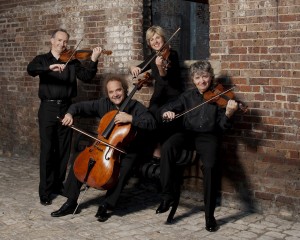
Thursday, October 14 | 8 pm
Rackham Auditorium
The always superlative Takács Quartet has become an Ann Arbor favorite over the past decade, consistently delivering performances that live well beyond the last note played in the concert hall. In the 10/11 season, they perform a three-concert cycle of Schubert’s quartets and quintets, with the first performance launching the Chamber Arts Series. Commenting on their latest Schubert recording for Hyperion, Gramophone magazine noted, “The Takács have the ability to make you believe that there’s no other possible way the music should go, and the strength to overturn preconceptions that comes with only the greatest performers.” This first concert features pianist Jeffrey Kahane, and balances two Schubert string quartets with the young American composer Daniel Kellogg’s Variations on “Death and the Maiden.”
Program
Schubert String Quartet in E-flat Major, D. 87
Schubert Piano Sonata in B-flat Major, D. 960 (Op. Post.)
Daniel Kellogg Variations on a Theme from “Death and the Maiden”
Schubert String Quartet in d minor, D. 810
Jerusalem Quartet
Thursday, October 21 | 8 pm
Rackham Auditorium
“Superlatives are inadequate in describing just how this playing was from one of the young, yet great, quartets of our time.” (The Strad) Returning after its widely acclaimed UMS visit in 2007, the Jerusalem Quartet was formed in 1993, when its members were still teenagers, within the framework of the Young Musicians’ Group under the auspices of the Jerusalem Music Centre and the America Israel Cultural Foundation. “Musical electricity may be unfathomable, but one thing is for sure — they have it.” (The Strad)
Program
Mendelssohn Quartet in e minor, Op. 44, No. 2
Mark Kopytman String Quartet No. 3 (1969)
Brahms Quartet in c minor, Op. 51, No. 1
The Historic Concert
ONCE.MORE Festival:
A 50th Anniversary Moment
Tuesday, November 2 | 8 pm
Rackham Auditorium
The ONCE Group was a collection of musicians, visual artists, architects, and film-makers who wished to create an environment in which artists could explore and share techniques and ideas in the late 1950s and early 1960s. The group hosted the ONCE Festival six times in Ann Arbor in the early 1960s; one of the enduring outcomes of this group is the Ann Arbor Film Festival. The organizers of the ONCE festival were five composition students of U-M composition professor Ross Lee Finney, whose sabbatical in Europe resulted in a revolution of sorts among his students, who began using electronics in their compositions. This concert represents the historic works presented during Ann Arbor’s ONCE Festival some 50 years ago; a second concert, presented two days later (and not on the Chamber Arts Series), will look at more recent works by the same composers. This special collaboration with the U-M School of Music, Theatre & Dance will provide a look into Ann Arbor’s progressive role in the development of avant-garde music.
Program
Roger Reynolds Mosaic for Flute and Piano (1962)
Robert Ashley in memoriam…Crazy Horse (1963)
Gordon Mumma Large Size Mograph (1962)
Donald Scavarda Group for Piano (1959)
Robert Ashley in memoriam…Esteban Gomez (1963)
Donald Scavarda FilmSCORE for Two Pianists (1962)
Donald Scavarda GREYS, A FilmSCORE (silent version) (1963)
Scavarda/Mumma GREYS, A FilmSCORE (with sound) (1963)
Gordon Mumma Sinfonia (1958-60)
Donald Scavarda Matrix for Clarinetist (1962)
Roger Reynolds A Portrait of Vanzetti (1962-63)
Nadja Salerno-Sonnenberg, violin
New Century Chamber Orchestra
Friday, February 4 | 8 pm
Rackham Auditorium
Electrifying performances, fearless interpretations, and musical depth have established the violinist Nadja Salerno-Sonnenberg as one of the leading violinists of our time. She was born in Rome and immigrated to the United States at the age of eight to study at The Curtis Institute of Music, beginning her professional career in 1981 when she became the youngest person ever to win the Walter W. Naumburg International Violin Competition. For the past two years, she has served as music director of San Francisco’s New Century Chamber Orchestra, which makes its UMS debut with a program that includes Astor Piazzolla’s Four Seasons of Buenos Aires, a tango-inspired version that complements the Vivaldi and Philip Glass “Four Seasons” on the Choral Union Series.
Program
Wolf/arr. Drew Italian Serenade (1887)
Bartók/Willner Romanian Folk Dances
Piazzolla Four Seasons of Buenos Aires (1964-70)
Tchaikovsky Serenade for Strings in C Major, Op. 48
Concertante and Rafał Blechacz, piano
Sunday, February 13 | 4 pm
Rackham Auditorium
Comprised of a core of six virtuoso string players, Concertante performs in varied combinations of instrumentalists with a sheen, warmth, and polish that are the hallmark of superb chamber music groups. For this concert, they are joined the Polish pianist Rafał Blechacz, who performs in recital on the Choral Union Series two nights earlier, for a chamber arrangement of Chopin’s Piano Concerto No. 1, written when the composer was only 20 years old. Blechacz is widely regarded as a supreme interpreter of Chopin’s works, sweeping all five first prizes at the 2005 International Chopin Competition when he was just 20, the first Pole to achieve the honor since Krystian Zimerman in 1975.
Program
Elgar Serenade for Strings in e minor, Op. 20
Schoenberg Verklärte Nacht, Op. 4
Chopin Piano Concerto No. 1 in e minor, Op. 11
Scharoun Ensemble Berlin
Chamber Musicians of the Berlin Philharmonic
Wednesday, March 9 | 8 pm
Rackham Auditorium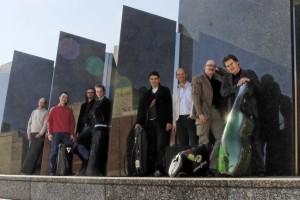
In 1983, members of the Berlin Philharmonic founded the Scharoun Ensemble Berlin, named after the architect who designed the marvelous concert hall where the Berlin Philharmonic performs at home. The eight musicians of the Scharoun Ensemble express an artistic commitment to both the heritage of the past and the challenges of the present. The ensemble comprises the standard octet instrumentation — clarinet, horn, bassoon, two violins, viola, cello, and double bass —allowing them to perform some of the great chamber music literature of Schubert, Mozart, Beethoven, and Brahms, in addition to 20th-century classical modernist works and contemporary music.
Program
Schubert Octet in F Major, D. 803
Additional works to be announced.
Tetzlaff Quartet
Saturday, April 9| 8 pm
Rackham Auditorium
The terrific German violinist Christian Tetzlaff, who most recently appeared with as soloist with the San Francisco Symphony, in addition to solo recital appearances at both St. Francis of Assisi Catholic Church and Hill Auditorium, brings his chamber ensemble, the Tetzlaff Quartet. The group was founded in 1994 by Tetzlaff and his sister, Tanja, along with two musicians with a mutual devotion to chamber music whom they met at a chamber music festival in Switzerland. Despite reduced availability, they make a commitment to perform each year as a quartet, drawing accolades from critics and casual listeners alike.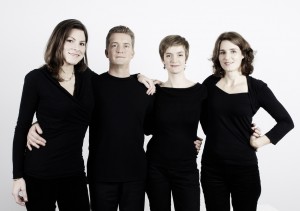
Program
Haydn Quartet in g minor, Op. 20, No. 3
Mendelssohn Quartet in a minor, Op. 13
Sibelius Quartet in d minor, Op. 56 ”Voces Intimae” (1909)
Schubertiade Series
The always superlative Takács Quartet has become an Ann Arbor favorite over the past decade, consistently delivering performances that live well beyond the last note played in the concert hall. In the 10/11 season, they perform a three-concert cycle of Schubert’s quartets and quintets (Thursday, October 14; Sunday, February 20; and Friday, April 8).
Schubert Cycle Concert 2
Takács Quartet
Sunday, February 20| 4 pm
Rackham Auditorium
Program
Schubert String Quartet in B-flat Major, D. 112
Schubert String Quartet in a minor, D. 804
Schubert String Quartet in G Major, D. 887
Schubert Cycle Concert 3
Takács Quartet
Jeffrey Kahane, piano
Paul Katz, cello
John Feeney, double bass
Friday, April 8 | 8 pm
Rackham Auditorium
Program
Schubert Piano Quintet in A Major, D. 667 (“Trout”)
Schubert Cello Quintet in C Major, D. 956
Tickets for the 7-concert series range from $124-$256. Subscription renewal packets and brochures will be mailed in early May.
An additional option that includes all three Schubert concerts by the Takács Quartet (nine concerts total) ranges from $170-$340.
Tickets to individual events on the series go on sale on Monday, August 23 (via www.ums.org) and Wednesday, August 25 (in person and by phone).
Which events in the season are you most anticipating? Let us know in the comments area below.
The always superlative Takács Quartet has become an Ann Arbor favorite over the past decade, consistently delivering performances that live well beyond the last note played in the concert hall. In the 10/11 season, they perform a three-concert cycle of Schubert’s quartets and quintets, with the first performance launching the Chamber Arts Series. Commenting on their latest Schubert recording for Hyperion, Gramophone magazine noted, “The Takács have the ability to make you believe that there’s no other possible way the music should go, and the strength to overturn preconceptions that comes with only the greatest performers.” This first concert features pianist Jeffrey Kahane, and balances two Schubert string quartets with the young American composer Daniel Kellogg’s Variations on “Death and the Maiden.”


